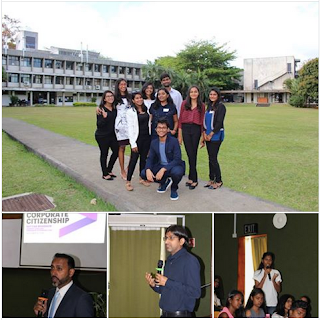Here is a copy of my speech on that occasion as the Chief Guest of the event, representing the Vice-Chancellor.
Prof Hookoomsing, former Pro Vice-Chancellor of the University, Ms Bhurtoni (Disability Activist), Mr Boodhun (Legal Lead Accenture Mauritius), Ms Gopee (Project Coordinator, Inclusion Mauritius), Colleagues of the University, Staff and Students,
Ladies and Gentlemen – good afternoon to you all.
Ladies and Gentlemen – good afternoon to you all.
 I am pleased today to be among you here on the occasion of this laudable initiative by the UoM Students’ Tri-Sector Society in the context of the International Day of Persons with Disabilities. At the level of the University and in line with our Core Values, we are leaving no stone unturned to put in place appropriate infrastructure to ensure that our fellow citizens with any type of disability are given the full support to study in a conducive and inclusive environment. Access to education is a critical factor for anyone to have a chance to live a decent and normal life afterwards. However, there is still more to be done, and we reckon that without the support and contribution of each and everyone of us, progress will be limited.
I am pleased today to be among you here on the occasion of this laudable initiative by the UoM Students’ Tri-Sector Society in the context of the International Day of Persons with Disabilities. At the level of the University and in line with our Core Values, we are leaving no stone unturned to put in place appropriate infrastructure to ensure that our fellow citizens with any type of disability are given the full support to study in a conducive and inclusive environment. Access to education is a critical factor for anyone to have a chance to live a decent and normal life afterwards. However, there is still more to be done, and we reckon that without the support and contribution of each and everyone of us, progress will be limited. The tri-sector concept is no doubt one of the key ingredients to help towards the holistic inclusion of persons with disabilities in the society, as we can witness today by the presence of friends from the private sector, civil societies and government, including academia. At the University, we have coined the term a bit differently through what we call the triple-helix model with a fourth dimension, the people. Indeed, no model or approach will be successful if the human aspect is not present.
Mauritius is a fast-developing country, and the ingredients that will help us to move from a middle-income country to a high-income economy is there, the blueprint is there and key actions are reflected every year in the budget. But in that quest for development and economic progress, there are two important questions to answer:
- In our rush and quest for more progress and development, are we not leaving behind key values of humanity, mankind and ensure inclusion at all levels and for all types of vulnerable groups?
- How come in the Mauritius of the 21st Century we still have families living in extreme poverty, and others struggling to live a decent life because of prejudices?
Inclusion of all different groups in society is indeed a pressing issue not only at the local level but in a global world and is not only limited to people with disabilities. Indeed, having international days to remember, celebrate and sensitize the world about challenges, difficulties and achievements of mankind and organizing workshops and events of this kind definitely help to further such causes that we live and stand for. However, it will be of no use if there is no change in human mentality and our inner attitudes, behavior and the whole bunch of prejudices that exist from within us.
To be able to bring this change in mentality and inner attitudes we first need to go back to what we often call “the first principles” and engage in deeper thinking about the very basis of our existence on this earth and about its purpose. Today in this world we are taught to show contempt first rather than compassion towards a fellow human being. Yes, while giving someone 5 cents to complete the rupee you might have been lured by unknowingly paying for someone to buy a cigarette but have you ever thought that in some other cases it might have been the 5 missing cents for someone to buy milk for his kids? No, because we are now in a ruthless society where everyone is in a race to get ahead of the other. We have learnt to think differently. We are taught to look at the 5 cents less we will have rather than the rupee the person in need will have and which could change the world for him.
It is unfortunate today that mankind despite being granted with brilliance, intelligence, and superior abilities, yet drops bombs in its greed for power and thirst for more wealth to create more disabled persons. As somebody has rightly said “I see humans but no humanity”. This is why today, it is more than commendable that you are engaged in a noble cause linked to basic humanitarian values of not letting anyone behind and helping each other to overcome the challenges of life which often takes diverse forms.
Therefore, as the youth representing the future generations of leaders, professionals, and as ordinary citizens, my message to all of you here is to never abandon those in need and to always thrive to give mankind back “ses lettres de noblesse”. It does not take much to be a better human being and I personally believe that there is no better place than a University to set the foundations for a better world. On this note, and on behalf of the Vice-Chancellor and the University, I wish to reiterate my thanks to all those present as well as the speakers who have kindly agreed to take part in this workshop.